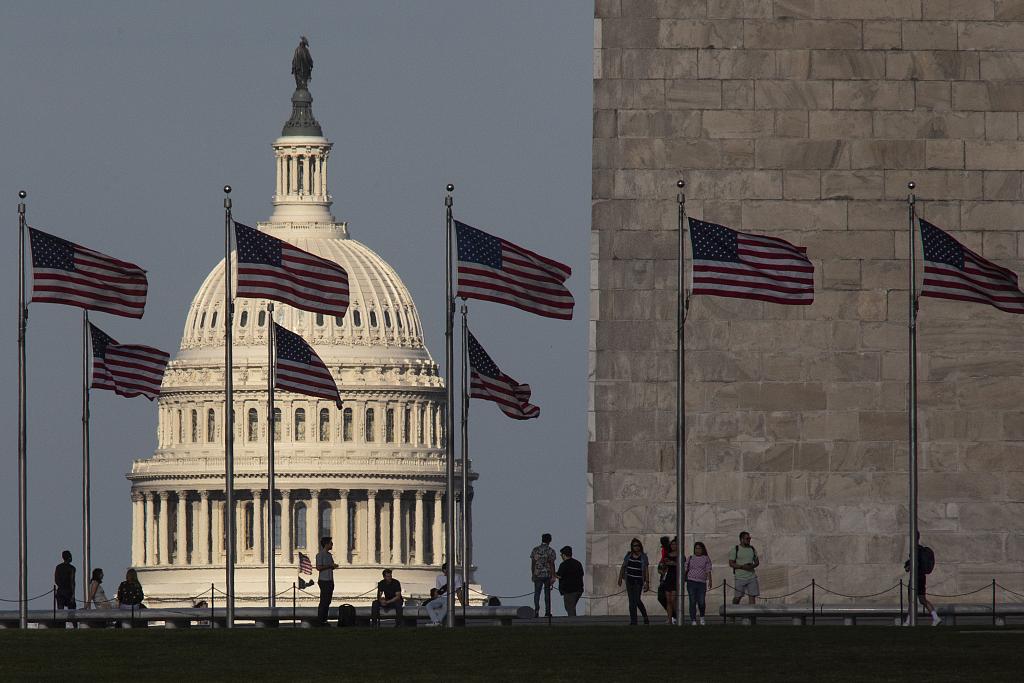?Average life expectancy in US falls
- By Mitchell Blatt
 0 Comment(s)
0 Comment(s) Print
Print E-mail China.org.cn, June 16, 2023
E-mail China.org.cn, June 16, 2023

Tourists spend time on the National Mall in Washington D.C., the United States, in June 2022. [Photo/VCG]
Life expectancy in the United States declined during the COVID-19 pandemic and continued to decline after life expectancy in other countries began to rebound, according to multiple reports by doctors and scientists.
In 2019, the average American was predicted to live for over 78 years. That was already shorter than the average lifespan of Americans in 2015: almost 79 years. In 2010, Americans were living 78.6 years on average. So the COVID-19 pandemic didn't begin this troubling trend but rather exacerbated it. In the two years of massive coronavirus outbreaks, the U.S. average life expectancy declined by about two years.
But the root cause goes deeper than just the increased incidence of disease. Looking at the comparison between healthcare spending and life expectancy, it is obvious that the United States is an outlier. Despite having a GDP per capita of over $50,000, which is greater than the United Kingdom, Japan, Turkey, and all but four countries in the OECD, American life expectancy is shorter than all but six OECD countries.
Thomas J. Bollyky, the director of the global health program at the Council on Foreign Relations, summarized the problem as such: "The broader deterioration in Americans' health worsened the toll of the pandemic in this country, with higher rates of cardiovascular disease, obesity, and diabetes leading to more COVID-19 deaths than many other peer nations."
The problems that led to Americans' deteriorating health are manifold. And not all of them can be solved by government action.
Why are 36.2% of Americans obese? That is the highest rate of any large country with a population of greater than 5 million. One factor is the dietary choices of Americans.
A quarter of Americans eat fast food every day. Many order supersize portions. The U.S. ranks second in the consumption of ice cream and fifth-to-last in the OECD in the consumption of fruits. Diet is a contributing factor to obesity.
The government does do some things to try to influence people's dietary choices. Former First Lady Michelle Obama, for example, promoted healthy eating and helped launch the National School Lunch Program, which improved the nutritional content of school lunches.
The kinds of food that are available in urban areas are also influenced in part by government regulations and zoning. For example, fast food proliferates in America in part because American cities are sprawling car-centric networks of roads and parking lots. This kind of city design is amenable to quick-service restaurants with foods that are easy to carry out and eat.
Some cities have tried banning the opening of new fast food establishments. South Los Angeles banned "free-standing" fast food outlets in 2008. A couple of years later, however, studies found that the rate of obesity there had not decreased.
There were a couple of problems with L.A.'s ban and with the idea of banning fast food restaurants generally. First, the L.A. ban only addressed restaurants that stood by themselves, but in cities, there are also a lot of unhealthy food offerings at the mall food court and the bodega. Not to mention, there were already a lot of fast food restaurants in Los Angeles that didn't have to close.
Secondly, big box grocery stores are already doing a good job of making Americans fatter. Roland Sturm, a researcher with the RAND Corporation, says supermarkets "are especially good at purveying soda and candy at low prices."
Walmart and Sam's Club sell huge quantities of Coca-Cola, Lays potato chips, and Cheez Whiz at large discounts. "Food's gotten cheaper and more readily available, so we eat more of it. It's really simple. At least a sizable portion of the rise in obesity can be characterized as responses to economic incentives," said Georgia State University professor Charles Courtemanche.
Obesity is just one part of the problem. There has also been an increase in drug overdoses, a hike in the murder rate, and a rising suicide rate.
The problems, in some cases, are interconnected. Drug overdoses often occur for the same reason as suicide attempts: depression and desperation.
Mitchell Blatt is a columnist with China.org.cn. For more information please visit:
http://m.formacion-profesional-a-distancia.com/opinion/MitchellBlatt.htm
Opinion articles reflect the views of their authors, not necessarily those of China.org.cn.





